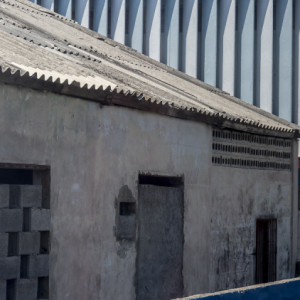Confounded expectations
Maria, our host in Santa Clara, is an agronomist who has given up her profession to run a bed and breakfast for tourists because it means she earns CUC, the tourist currency, worth 25 times the national currency. So it wasn’t a surprise, when she called a taxi-driver friend to take us to the bus station, to discover that he is also an agronomist. Who, I wonder, is left doing the important jobs in Cuba?
We didn’t know which way the Trinidad bus would go round the Sierra d'Escambray – mountains with lush vegetation where we hope to walk while we’re in Trinidad. It turned out to be via Cienfuegos, where we’re due in a few days’ time, and its curious blue bus station (extras). Trinidad’s bus station is in the middle of town so Iris, who runs the casa particular that Maria made many phone calls to find for us, came to meet us on foot. We’ve been avoiding large places but Iris’s family home is an old tobacco factory with huge high rooms and lots of old furniture, not dissimilar to some of the museums we've seen. Very grand with, in our room, a vast marquetry wardrobe with the Cuban flag inlaid above its doors.
In the spacious courtyard we met some US tourists who have been asking Cubans a different set of questions from us: ‘What do you know about the Guantanamo Bay base?’ Everyone they have so far asked has answered that it is a US military base. No-one has said that it is a prison. Do Cubans not know, I wonder? Or does their questioners’ American accent shape the answer?
We escaped from their generous offer of rum and cigars for a walk. In the elegant colonnade along one side of Plaza Mayor, an unexpectedly small square for the heart of old Trinidad, we were accosted by an elderly man who certainly hadn’t turned down rum this evening. As with many other people he was surprised to find we were British (most British tourists stay in the tourist resorts) but delighted, because when he’d stopped being a military pilot in the Angolan War he’d become an English teacher and he wanted to practise. He told us how hard things are in Cuba, how people are hungry. I told him I worked with people who also find things hard and who sleep on the streets. He frowned and thought for a bit.
‘Is that the truth?’
I assured him it was.
‘But how? No-one in Cuba sleeps on the streets and England is a rich country.’
I agreed.
He touched his head with his forefinger. ‘You are telling me very much. You are making me think. Is this really true?’
Indeed it is.
‘But England is cold. Not like here.’
‘Yes,' I said, ‘sometimes people die of cold on the streets.’
Now he was shocked. His eyes welled up. He leant forward and took my hands in his. ‘I am sorry for your people. I am so sorry for your people.’


Comments
Sign in or get an account to comment.


